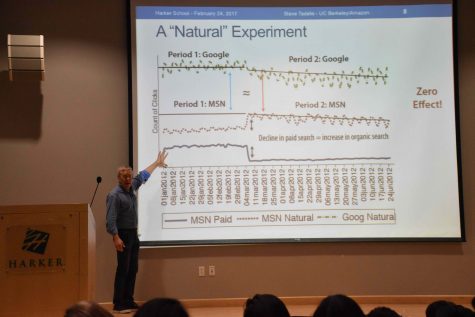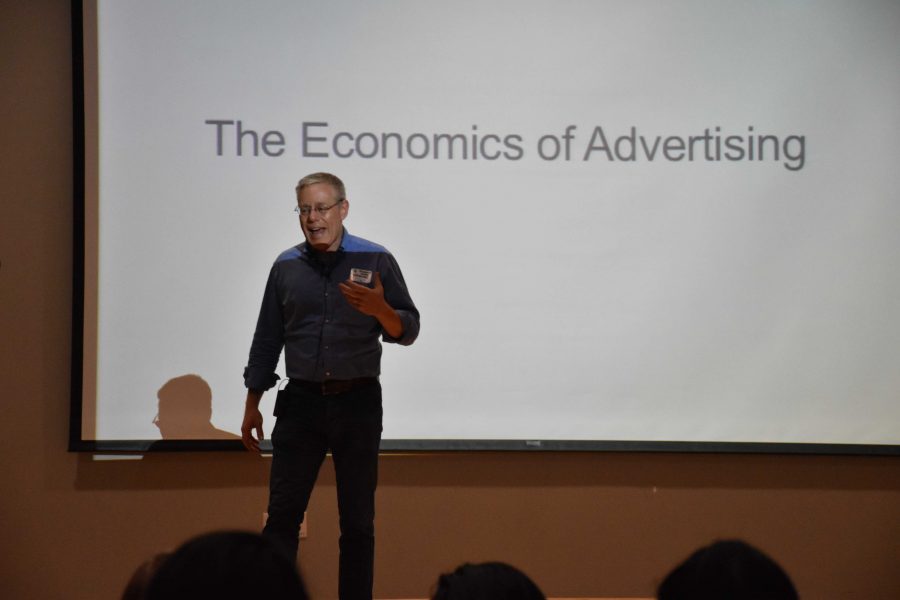Berkeley economist speaks at upper school
Speaker Dr. Steve Tadelis gave a presentation to Harker students during long lunch on Friday in the Nichols Auditorium. Tadelis addressed his microeconomic work on Ebay’s web advertising strategies in his talk.
February 24, 2017
UC Berkeley economics professor Dr. Steve Tadelis, gave a keynote presentation at an event hosted by the Oeconomia club at the Upper School during long lunch on Friday in the Nichols Auditorium. While Harker events have featured speakers from the local Stanford University and Santa Clara University, Tadelis is the first Berkeley economics professor to come to the upper campus.
Tadelis is currently on leave from his teaching post at UC Berkeley’s Haas School of Business, working in the corporate world with Amazon, where he serves as Vice President of Economics and Market Design at Amazon.
Opening his presentation titled “Economics in the Real World”, Tadelis made an important distinction between micro and macro economics, defining the difference between an economist specializing in each. He explained that a micro-economist analyzes individual decisions and factors in an economy, on the other hand, for macroeconomists, he jokingly remarked that he has “no idea” what they do.
For the majority of his presentation, Tadelis talked about his microeconomic work on Ebay’s web advertising strategies. He outlined an experiment in which he and his team were to determine the effectiveness of the company’s web advertisements–figuring out which channels brought customers to the site and the size of the purchases coming from each channel.
“[Marketers] try to connect data that tells them, what is the channel that someone came to eBay to buy something versus other channels, how much did they spend coming out of that channel,” he said. “I have to ask myself as an economist, what is the behavior that creates this data. People who click on an Ebay ad buy more than people who arrive from other channels.”

Dr. Tadelis gestures to a graph outlining the experiment he and his colleagues created to evaluate the effectiveness of Ebay’s web advertisements. “I have to ask myself as an economist, ‘what is the behavior that creates this data?'” Tadelis said.
The results of the research were contradictory to the hypothesis made by Ebay’s marketing professionals.Tadelis showed a graph that represented total sales with advertising and without. Surprisingly, it turned out that sales remained the same despite the fact that advertising was cut, a fact made true by Ebay inadvertently targeting people who already had the intention of shopping on their site. Tadelis joked that he wished he could take a fixed rate from the money Ebay saved as a result of his team’s research, a number he estimated to be around $20 million annually.
The second section of the keynote was a discussion of price salience, a concept which concerns the perceived or immediately apparent price of a good. Tadelis brought up the example of StubHub, where at checkout, both the price of the ticket and associated fees are added together. He explained that StubHub lost sales to competitors, who used a strategy of showing only ticket price without the addition of the processing and service fees.
He then analyzed the different approaches of analysis for behavioral economics, advocating . prescriptive analytics–a “question driven” approach with a “focus on causation” and “broad management and strategy.”
Ending his experimental analysis, Tadelis spoke about reasons why students should consider studying economics at a high level. He began by noting the growing role of PHD economists at large companies, citing Valley behemoths like Facebook, Uber, Ebay, and Amazon as examples.
He advised students to refrain from focusing solely on economics in college, telling the audience to pair the study with another skill such as programming, statistics, or advanced math to maximize and diversify intellectual application.
Sahil Kapur (11), an AP Economics student who attended the event, commented on his motivation for attending and what he learned from the presentation.
“I originally went for the Tadelis presentation because I really wanted to hear more about game theory, especially since he was a game theory professor,” he said. “I learned more about the real world views cases about economics beyond the classroom and beyond the examples we do in class. Especially how it can be applied to real world stuff today like such as online advertising.”
Tadelis’ presentation concluded with a short Q&A session. Students asked a range of questions from the problem of ad-blockers for advertising and the potential application of artificial intelligence in understanding behavioral economics.
To learn more about Dr. Tadelis and his research, visit http://faculty.haas.berkeley.edu/stadelis/.


















![“[Building nerf blasters] became this outlet of creativity for me that hasn't been matched by anything else. The process [of] making a build complete to your desire is such a painstakingly difficult process, but I've had to learn from [the skills needed from] soldering to proper painting. There's so many different options for everything, if you think about it, it exists. The best part is [that] if it doesn't exist, you can build it yourself," Ishaan Parate said.](https://harkeraquila.com/wp-content/uploads/2022/08/DSC_8149-900x604.jpg)




![“When I came into high school, I was ready to be a follower. But DECA was a game changer for me. It helped me overcome my fear of public speaking, and it's played such a major role in who I've become today. To be able to successfully lead a chapter of 150 students, an officer team and be one of the upperclassmen I once really admired is something I'm [really] proud of,” Anvitha Tummala ('21) said.](https://harkeraquila.com/wp-content/uploads/2021/07/Screen-Shot-2021-07-25-at-9.50.05-AM-900x594.png)







![“I think getting up in the morning and having a sense of purpose [is exciting]. I think without a certain amount of drive, life is kind of obsolete and mundane, and I think having that every single day is what makes each day unique and kind of makes life exciting,” Neymika Jain (12) said.](https://harkeraquila.com/wp-content/uploads/2017/06/Screen-Shot-2017-06-03-at-4.54.16-PM.png)








![“My slogan is ‘slow feet, don’t eat, and I’m hungry.’ You need to run fast to get where you are–you aren't going to get those championships if you aren't fast,” Angel Cervantes (12) said. “I want to do well in school on my tests and in track and win championships for my team. I live by that, [and] I can do that anywhere: in the classroom or on the field.”](https://harkeraquila.com/wp-content/uploads/2018/06/DSC5146-900x601.jpg)
![“[Volleyball has] taught me how to fall correctly, and another thing it taught is that you don’t have to be the best at something to be good at it. If you just hit the ball in a smart way, then it still scores points and you’re good at it. You could be a background player and still make a much bigger impact on the team than you would think,” Anya Gert (’20) said.](https://harkeraquila.com/wp-content/uploads/2020/06/AnnaGert_JinTuan_HoHPhotoEdited-600x900.jpeg)

![“I'm not nearly there yet, but [my confidence has] definitely been getting better since I was pretty shy and timid coming into Harker my freshman year. I know that there's a lot of people that are really confident in what they do, and I really admire them. Everyone's so driven and that has really pushed me to kind of try to find my own place in high school and be more confident,” Alyssa Huang (’20) said.](https://harkeraquila.com/wp-content/uploads/2020/06/AlyssaHuang_EmilyChen_HoHPhoto-900x749.jpeg)






